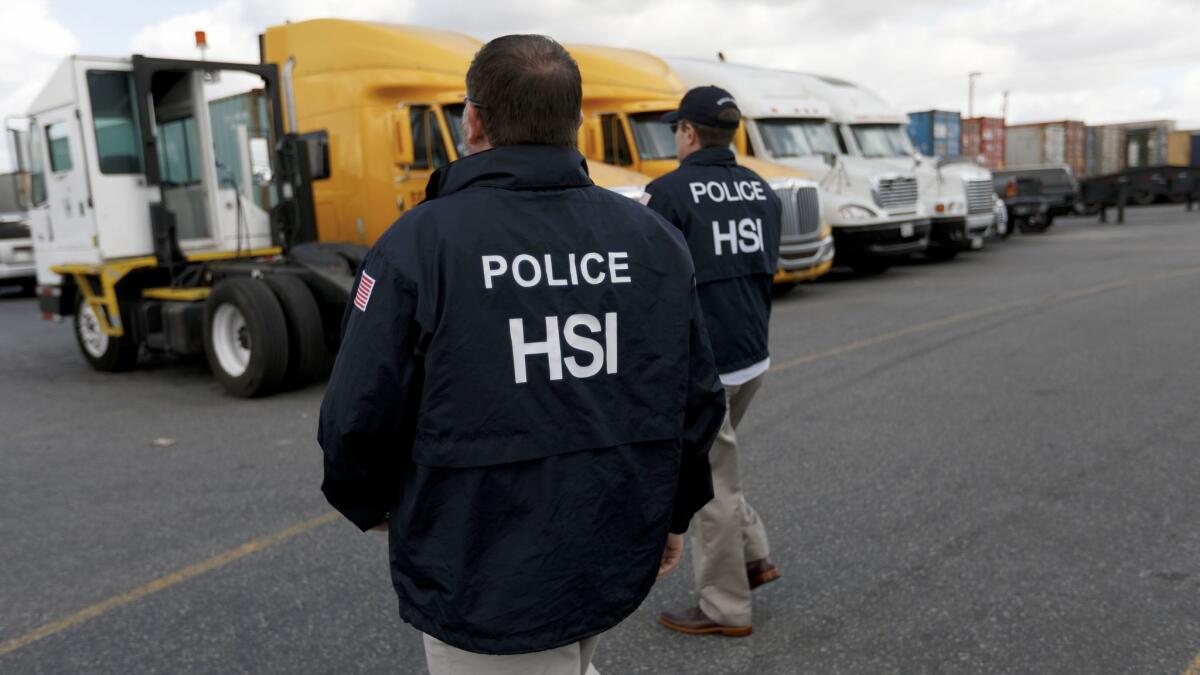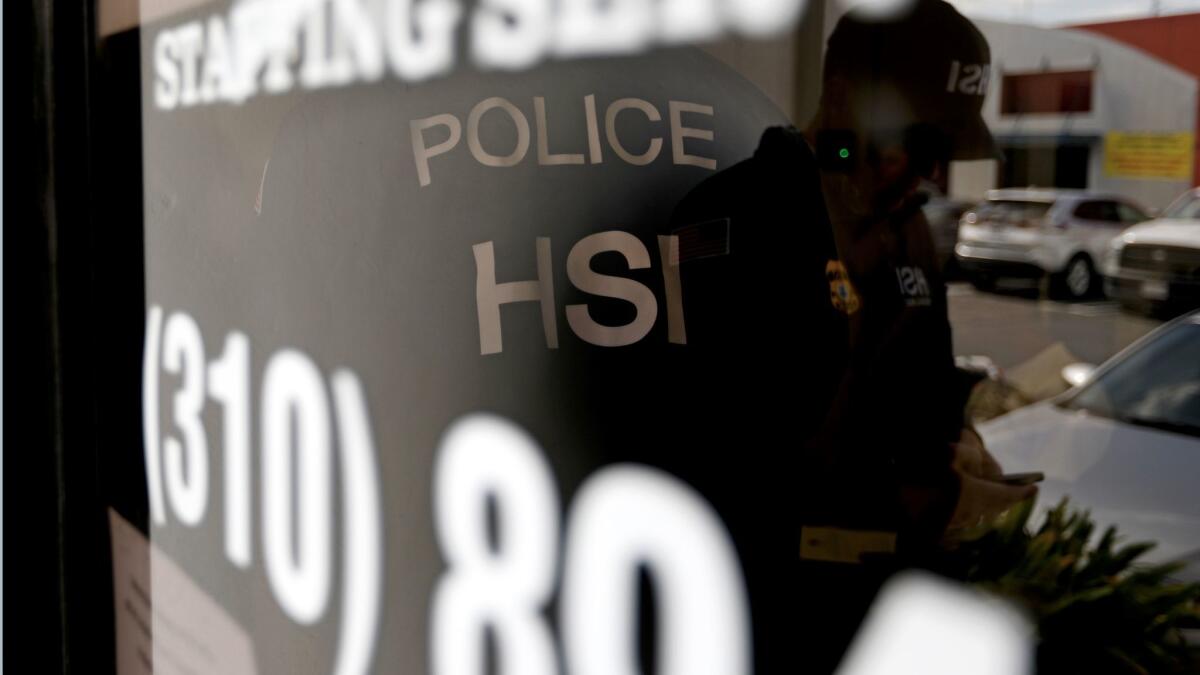ICE steps up enforcement at businesses in California, targeting employers and workers

The Immigration and Customs Enforcement agents put on their navy blue jackets and walked into a trucking companyâs office in Carson this week, sending waves of anxiety rippling through the building.
In the lobby, a nervous office manager greeted the team from ICEâs Homeland Security Investigations, twisting a black pen in her hands like a wet towel. A second manager joined them.
âI see people with vests and cameras,â he said with an anxious chuckle. âThatâs not good.â
The visit is part of a renewed wave in ICEâs efforts to crack down on illegal immigration in the Trump era. Federal authorities are stepping up audits of businesses, hoping to catch employers who hired those here illegally. The agencyâs acting director wants to increase work-site enforcement 400%, part of a much larger effort to identify and deport those here without proper papers.
During a five-day operation in the Los Angeles area that ended Thursday, more than 120 businesses were issued audit notices.
Officials said the purpose of the audits is twofold: to punish employers and employees breaking the rules as well as to discourage people from coming into the U.S. illegally for work, which critics have long said takes away job opportunities from citizens and legal residents.
âItâs a deterrent to somebody who is thinking about crossing the border, paying a smuggler and taking that perilous journey,â said Dani Bennett, an ICE spokeswoman. âIf there isnât that pull factor or perceived easy employment on the other side, there isnât that incentive to cross in the first place.â
The aggressive actions are the latest in the continued standoff between the Trump administration, which has vowed to crack down hard on illegal immigration, and California, which in October declared itself a âsanctuary stateâ for immigrants.
After Gov. Jerry Brown signed the sanctuary state bill into law, ICEâs acting director, Thomas Homan, warned that California âbetter hold on tight.â
But the audits are not new, and according to statistics provided by ICE, they hit their peak in 2013 under President Obama, with more than 3,100 such audits conducted that fiscal year. The Obama administration then shifted focus to deporting those convicted of serious crimes. In fiscal year 2017, ICE said it completed 1,360 audits in the U.S.

The audits can lead to civil fines and even criminal prosecutions if they find employers knowingly violated the law, ICE officials said.
For years, federal law did not bar the hiring of people in the country illegally. That changed in 1986, when President Reagan signed the Immigration Reform and Control Act, commonly called IRCA. It granted residency to 3 million people in the country without legal status, bolstered border enforcement and for the first time established penalties for hiring people in the country illegally.
But experts said the employer sanctions were watered down to win the support of industry, including the U.S. Chamber of Commerce and agricultural delegations from the Midwest. IRCA set relatively low fines, and the law said that, to be convicted, employers had to have âknowingly employedâ a person who was in the country without documentation.
That made it easier for employers armed with documents that could be fraudulent to claim that they didnât know, experts said. And it made convicting employers more difficult.
When ICE descended on Bee Sweet Citrus in the town of Fowler as part of broader audits in the Central Valley, the business was told it was being audited for I-9 compliance, and dozens of employees reportedly lost their jobs. The I-9 forms, filled out when employees are first hired, attest to their status to work legally in the country.
As rumors spread in January about an ICE sweep across California, a new state law went into effect prohibiting employers from allowing ICE access to private areas of their businesses without a warrant. It also required businesses to notify employees within 72 hours if they have been given notice of an inspection.
California Atty. Gen. Xavier Becerra warned businesses that not obeying the state law could result in a $10,000 fine.
Betty Jo Toccoli, president of the California Small Business Assn., said operations like recent sweeps of 7-Eleven stores unfairly target one type of business while giving others a pass. One of the groupâs members, a tortilla factory, also received notice about an ICE visit, and 15 employees did not show up to work, she said.
âWhy would you target a tortilla manufacturer? Because you think youâre going to find more people to deport,â Toccoli said.
The Times accompanied ICE agents on an audit operation around Los Angeles this week to see the process firsthand. The Times was allowed to ride along with ICE on the condition that the names of the businesses and employees would not be published.
At the Carson trucking company, an ICE auditor explained what was happening. ICE wanted to see the companyâs I-9 forms, and the auditor showed company officials what the document looks like.
As the minutes ticked by and the managers realized this was not a raid, their moods relaxed. But they expressed ignorance of I-9 forms, and the operations manager said he had never seen any of his employees fill one out.
The ICE auditor said the agency wanted the most recent payroll and all employee I-9s in seven days. The law allows them to demand those documents within three days, the auditor explained, but the extra four days were being given as a courtesy.
Outside the building, the agents debated how bad a sign it was that the companyâs managers had no idea what an I-9 form is. The auditor reasoned that it was not a big deal and that the companyâs human resources manager â who was away from the office â probably was acquainted with the forms.
On the ride to the next business, Jennifer Reyes, special agent in charge for Homeland Security Investigations Los Angeles, talked about how ICE is blamed for people losing their jobs as a result of the audits. She argued that it was the employersâ fault for hiring people in the country illegally in the first place.
ICE is trying to strike a balance with these audits, she said. The agency was levying fines on businesses that violate the law that are stiff enough to deprive them of some of the profits gained by hiring people in the country illegally, but not so harsh that the companies are put in danger of having to close.
At another trucking company in Compton, the owner invited the ICE squad into his office. The room was decorated in memorabilia, including a signed Kobe Bryant jersey and an Elvis cardboard cutout.
This time, the owner, who said he was happy to give them a whole box full of I-9 forms, was well-versed in what the agents were looking for.
âYou have seven days,â the ICE auditor said.
To read this article in Spanish, click here
Twitter: @adamelmahrek
More to Read
Sign up for Essential California
The most important California stories and recommendations in your inbox every morning.
You may occasionally receive promotional content from the Los Angeles Times.










